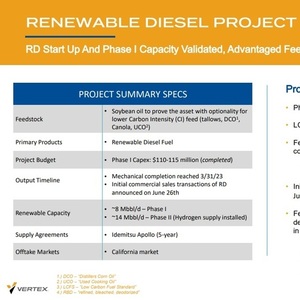Vertex works to expand feedstock types at Alabama biorefinery

August 9, 2023
BY Erin Krueger
Doug Haugh, chief commercial officer at Vertex Energy Inc., discussed the company’s efforts to expand the types of feedstocks processed in its renewable diesel unit during the company’s second quarter earnings call, held Aug. 9.
Vertex in mid-2021 announced an agreement to acquire an oil refinery in Mobile, Alabama, and convert a portion of it to renewable diesel production. The newly completed renewable diesel unit began operations this spring. In late June, Vertex announced it had completed the first series of commercial sales transactions of renewable diesel. The company on July 25 announced the renewable diesel unit had achieved the company’s phase 1 installed capacity target of 8,000 barrels per day.
Advertisement
Advertisement
During the earnings call, Haugh said now that the company has achieved commercial production sales of renewable diesel and proven the unit to run at designate rates with yields at or better than target, Vertex has quickly shifted its focus to accelerating the deployment schedule of its multi-feedstock supply and production strategy.
According to Haugh, the economics of producing renewable diesel from refined, bleached and deodorized (RBD) soybean oil are currently unattractive under prevailing market conditions. The renewable diesel unit and its supply system are multi-feedstock capable, but Vertex had initially anticipated a longer break-in period to stabilize and streamline operations while utilizing RBD soybean oil during the initial operation period, Haugh explained. However, he said the company’s supply, engineering and operations teams have worked diligently and were able to introduce distillers corn oil (DCO) into the company’s feedstock blend last week. In addition to DCO, Vertex has worked to advance technical tallow, canola oil and crude degummed soybean oil (CDSO) through its feedstock approval process. With those approvals now in place, Haugh said Vertex has obtained attractively priced commercial quantities of CDSO, technical tallow, canola and DCO for this quarter.
Advertisement
Advertisement
In addition, Haugh said Vertex’s feedstock development team is sourcing supplies of other, lower carbon intensity (CI) feedstocks and lower cost alternatives in the used cooking oil (UCO) and fats, oils and grease (FOG) market while also working to build a longer-term supply of agricultural oils produced from cover crops.
Related Stories
The U.S. Energy Information Administration maintained its forecast for 2025 and 2026 biodiesel, renewable diesel and sustainable aviation fuel (SAF) production in its latest Short-Term Energy Outlook, released July 8.
XCF Global Inc. on July 10 shared its strategic plan to invest close to $1 billion in developing a network of SAF production facilities, expanding its U.S. footprint, and advancing its international growth strategy.
U.S. fuel ethanol capacity fell slightly in April, while biodiesel and renewable diesel capacity held steady, according to data released by the U.S. EIA on June 30. Feedstock consumption was down when compared to the previous month.
XCF Global Inc. on July 8 provided a production update on its flagship New Rise Reno facility, underscoring that the plant has successfully produced SAF, renewable diesel, and renewable naphtha during its initial ramp-up.
The U.S. EPA on July 8 hosted virtual public hearing to gather input on the agency’s recently released proposed rule to set 2026 and 2027 RFS RVOs. Members of the biofuel industry were among those to offer testimony during the event.
Upcoming Events










